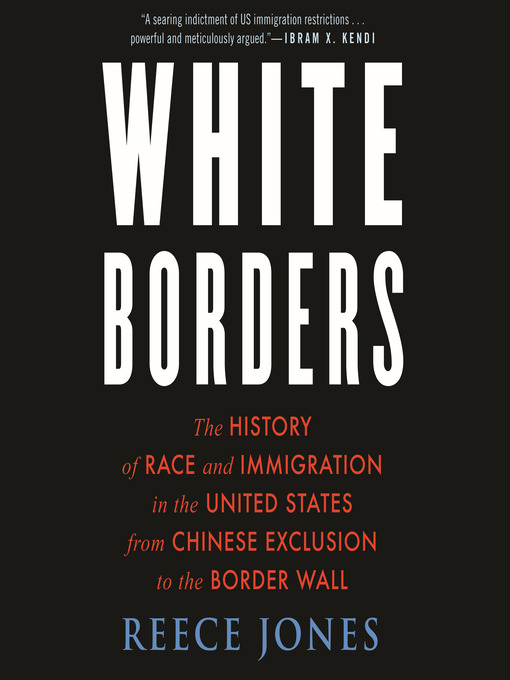- Popular Magazines
- Just Added
- Cooking & Food
- Fashion
- Health & Fitness
- Home & Garden
- News & Politics
- See all magazines collections
White Borders
The History of Race and Immigration in the United States from Chinese Exclusion to the Border Wall
—Ibram X. Kendi, award-winning author of Four Hundred Souls and Stamped from the Beginning
“A damning inquiry into the history of the border as a place where race is created and racism honed into a razor-sharp ideology.”
—Greg Grandin, Pulitzer Prize–winning author of The End of the Myth
Recent racist anti-immigration policies, from the border wall to the Muslim ban, have left many Americans wondering: How did we get here? In what readers call a “chilling and revelatory” account, Reece Jones reveals the painful answer: although the US is often mythologized as a nation of immigrants, it has a long history of immigration restrictions that are rooted in the racist fear of the “great replacement” of whites with non-white newcomers. After the arrival of the first slave ship in 1619, the colonies that became the United States were based on the dual foundation of open immigration for whites from Northern Europe and the racial exclusion of slaves from Africa, Native Americans, and, eventually, immigrants from other parts of the world.
Jones’s scholarship shines through his extensive research of the United States’ racist and xenophobic underbelly. He connects past and present to uncover the link between the Chinese Exclusion laws of the 1880s, the “Keep America American” nativism of the 1920s, and the “Build the Wall” chants initiated by former president Donald Trump in 2016. Along the way, we meet a bizarre cast of anti-immigration characters, such as John Tanton, Cordelia Scaife May, and Stephen Miller, who pushed fringe ideas about “white genocide” and “race suicide” into mainstream political discourse. Through gripping stories and in-depth analysis of major immigration cases, Jones explores the connections between anti-immigration hate groups and the Republican Party. What is laid bare after his examination is not just the intersection between white supremacy and anti-immigration bias but also the lasting impacts this perfect storm of hatred has had on United States law.
-
Creators
-
Publisher
-
Release date
October 12, 2021 -
Formats
-
OverDrive Listen audiobook
- ISBN: 9780807094167
- File size: 249127 KB
- Duration: 08:39:00
-
-
Languages
- English
-
Reviews
-
Kirkus
July 15, 2021
A critical examination of U.S. immigration policies across the centuries as instruments of racism. Jones, a professor of geography and environment in Hawaii, reveals that that island state, as well as Puerto Rico, were long excluded from allowing immigrants precisely because both "had large nonwhite citizen populations." This exclusion followed from a 19th-century policy, born of Jeffersonian tenets at the birth of the republic, that held that the notion of all men being equal applied to White men only, with only "a free white person" eligible for citizenship. Such convictions were common in Jefferson's day--and in Trump's. As Jones writes, Reince Priebus, then serving as Republican National Committee chair, warned Trump to tone down his racism during the 2016 campaign "because it could tarnish all of the Republicans running for president," to which Trump responded by doubling down on his anti-Mexican and then anti-Muslim rhetoric. Jones engages in good investigative journalism to chase down the sources of Trumpthink, given that Trump has never had an original idea of his own, in a complex and "carefully orchestrated effort" to place the racist, exclusionary politics of a century past (pitched largely at excluding Asians from coming to the U.S.) at the center of a new sort of mainstream politics feeding a fearful base. This effort involved the feeding of millions of dollars to anti-immigration groups--$63 million from one donor alone. These groups exalted ideas by the likes of a Michigan ophthalmologist named John Tanton, who asserted that "for European-American society and culture to persist requires a European-American majority." By this incisive account, that concept was red meat for the likes of Steve Bannon and Stephen Miller, the latter of whom cut his teeth on the racist politics of former Trump ally Jeff Sessions. The author's ability to connect the dots is impressive--and depressing, since the politics of ethnic hatred persist.COPYRIGHT(2021) Kirkus Reviews, ALL RIGHTS RESERVED.
-
Library Journal
Starred review from October 1, 2021
Jones (geography and environment, Univ. of Hawai'i; Violent Borders) delivers a concise history of American immigration policy, from the Chinese Exclusion Act of 1882 to the Trump era. The book peels back the surface of American policies that restricted immigration, and analyzes the underlying impulses and biases. Jones argues that prejudice and white supremacy are at the root of policies limiting entry into the United States. Individual states created the first immigration restrictions, Jones adeptly explains, while the federal government was only empowered to grant citizenship rights; it would take subsequent Supreme Court rulings to shift immigration policymaking to the federal government. Jones does an excellent job simplifying these Supreme Court rulings and explaining how the laws were enacted. He carefully investigates contemporary private companies that wield their political power and pour considerable funds into efforts to block immigration reform. He also identifies tangible relationships (historical and/or contemporary) between a number of American companies and white supremacist organizations. VERDICT A highly recommended, in-depth history of migration that accounts for the lives affected by American border policing and immigration restrictions.--Jacob Sherman, Univ. of Texas, San Antonio
Copyright 2021 Library Journal, LLC Used with permission.
-
Loading
Why is availability limited?
×Availability can change throughout the month based on the library's budget. You can still place a hold on the title, and your hold will be automatically filled as soon as the title is available again.
The Kindle Book format for this title is not supported on:
×Read-along ebook
×The OverDrive Read format of this ebook has professional narration that plays while you read in your browser. Learn more here.


